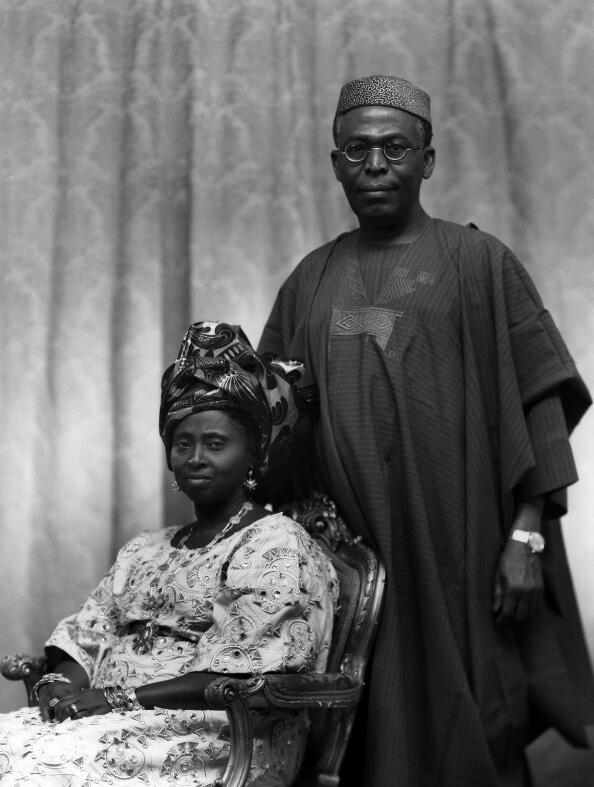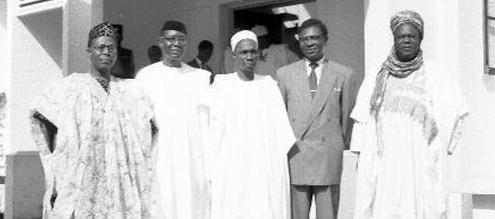
7 minute read
Famous firsts in Nigeria
Famous First in Nigeria
Obafemi Jeremiah Oyeniyi Awolowo, GCFR
Advertisement
WAS A LAWYER, POLITICIAN, AN ENTREPRENEUR, NIGERIAN NATIONALIST AND STATESMAN WHO PLAYED A CRUCIAL ROLE IN NIGERIA’S INDEPENDENCE MOVEMENT, THE FIRST AND SECOND REPUBLICS AND THE CIVIL WAR.
HIS BEGINNING
Chief Obafemi Awolowo was born on March 6th,1909 in Ikenne, in the present-day Ogun State of Nigeria. His father, a farmer and sawyer, died when he was about seven years old. Chief Awolowo started his career, as a nationalist in the Nigerian Youth Movement in which he rose to become Western Provincial Secretary. It was him that brought a large amount of the enlightened social legislation that has helped made Nigeria a prevailing nation. Awo was the first Leader of Government Business, and a Minister of Local Government and Finance. He became the first Western Region Premier, during the Nigeria’s parliamentary system, of 1952 to 1959 and also the official Leader of the Opposition in the federal parliament from 1959 to 1963 during the time of Balewa government. Awolowo was also the first in the modern era to be named Leader of the Yorubas. The Asiwaju Awon Yoruba or Asiwaju Omo Oodua.
After his education at Wesley College, Ibadan in 1927, he enrolled at the University of London as an External Student and later graduated with the degree of Bachelor of Commerce (Hons.). In 1944, Awolowo went to the UK to study law at the University of London, and on 19

November 1946, was called to the Bar by the Honourable Society of the Inner Temple. Awolowo founded the Nigerian Tribune in 1949, and it still remains the oldest surviving private Nigerian newspaper till date. He used the newspaper to spread nationalist consciousness within the country.
HIS CAREER, LIFE, REPUTATION AND HEROIC WORKS
Earlier, in London, in 1947, Chief Awolowo formed the Egbe Omo Oduduwa, an association dedicated to preserve the advancement of Yoruba culture in the new world conditions. After that, in 1951, he went on to found the Action Group. And the party, alone among the major political parties, demanded immediate Nigeria independence from the British on the basis of federalism. Awo led the Action Group (also the first Nigerian political party to write and present a proper election manifesto) to victory in the Western Regional elections of 1951.
He became Minister for Local Government and Finance as well as Leader of Government Business, ultimately becoming the first premier of the Region when it was elevated to a federating unit in 1954. He was the official Leader of the Opposition to the Balewa Government from 1959 to 1963 after he had left the Western Region to contest elections to the prime ministership of Nigeria at the centre. He was chosen by the Yoruba elite as their political Leader or, formally, Leader of the Yorubas, during the peak goodwill period following his release from imprisonment for about three years on the charge of plotting to overthrow the national government. He was appointed Federal Commissioner for Finance and Vice-President of the Federal Executive Council in the Federal Military Government of General Gowon during the Civil War. Chief Awolowo was the leader and presidential candidate of the Unity Party of Nigeria, that contested the elections of 1979 and 1983. He retired from politics after millitary came into power and terminated the Second Republic in 1983.
Awolowo remains perhaps Nigeria’s most controversial politician. He helped the Western Region to attained in 1960 first home rule for his people that he secured in 1957. He was admired for his significant role in saving the federation in the Civil War of 1967 and for his welfarist and dynamic leadership. In particular, he pioneered the free primary education, free health care programmes and the Oduduwa Group, all of which were financed from the lucrative cocoa industry which was the mainstay of the regional economy. He implemented the first minimum-wage policy by a Nigerian government at any level and he also established the first television station in Africa as well as The University of Ibadan. the first Nigerian university whose creation was not even recommended by the Federal Government of the day.
HIS LEGACY Awolowo is credited with devising the name “naira” for the Nigerian standard monetary unit and helped to finance the Civil War and preserve the federation without borrowing. Chief Awolowo built the Liberty Stadium in Ibadan, the first of its kind in Africa; established the WNTV, the first television station in Africa; erected the first skyscraper in tropical Africa: the Cocoa House (still the tallest in Ibadan) and ran a widely-respected civil service in the Western Region.
Ghana’s Kwame Nkrumah was reputedly one of his admirers and some of his followers in the South-West have continued till date to use his name and the policies of his party, the Action Group, during campaigns. In contrast, his welfarist theories have influenced politicians in most of the other geopolitical zones of the nation.
The Obafemi Awolowo Foundation was founded as a non-profit, an independent, non-partisan organisation in 1992. It was committed to furthering the symbiotic interaction of public policy and relevant scholarship to promote the overall development of the Nigerian nation. The Foundation was launched by former President, General Ibrahim Babangida, at the Liberty Stadium, Ibadan. However, his most essential legacies are his exemplary integrity, his welfarism, his contributions to hastening the process of decolonisation and his consistent and reasoned advocacy of federalism-based on ethnolinguistic self-determination and uniting politically potent states to be the best basis for Nigerian unity. Chief Awolowo died peacefully at his Ikenne home, the Efunyela Hall, on 9 May


1987, at the age of 78, amid tributes across political and ethnoreligious divides.
HIS ACHIEVEMENTS SUMMARY: Chief Awolowo’s greatest achievements resulted from the foresight, clear sense of direction and sheer competence that he brought into government. At the beginning of his career in government, Chief Awolowo quickly reformed the Local Government system of the Western Region and took revolutionary steps to Nigerianise and improve the Western Nigeria Civil Service. An excellent accessor of men’s qualities, that enabled him to put together a very efficient team of ministers. Having taken those steps, he was set to achieve within 5 years a string of “Firsts” in the history of Africa. Between 1954 and 1959, his government evolved, and was served by, the most efficient Civil Service in Black Africa; introduced and successfully implemented the first Free Primary Education programme in Africa; ·introduced and successfully managed the first Free Medical Service programme in Nigeria – for children up to the age of 18; established the first Television Station in Africa;· built the Liberty Stadium, the first such modem sports facility in Nigeria;· introduced and successfully implemented the first minimum wage policy in Nigeria and actually paid to Western Nigerians from October 1954 a minimum wage that was double the amount other workers of the same level in some other parts of Nigeria are paid; · set up Nigeria’s first industrial complex at Ikeja;· set up Nigeria’s first commercial Housing Estates at Ikeja and Bodija, Ibadan. Besides these, Chief Awolowo’s government had laid the Foundation for development in commerce and industry by creating an efficient Western Nigeria Development Corporation, the ancestor of the present-day O’dua Investment Company;· taken successful bold steps to revolutionise the production and marketing of cocoa by farmers in Western Nigeria; and created the infrastructure for rural development by promoting 900 cooperative societies in about 3 years and by providing within 5 years almost 10 times as many miles of road as he inherited from the British administration. There is a not-so-visible achievement arising from all these. By making election promises and fulfilling them within a few years, Awo had led his Region to evolve a culture that demands and evaluates a socio-economic programme from those who seek political positions. In the Federal government, Awo managed the finances of Nigeria so shrewdly and so competently that the Federal Government successfully waged a costly 30-month civil war against secession without resorting to foreign loans and without compromising its sovereignty.
HONOURS: In recognition of his intellectual contributions, Awolowo was honoured by several institutions of higher learning in Nigeria and Ghana. In recognition of his professional contributions at the Bar, in 1978, he was made a Senior Advocate of Nigeria (SAN). In recognition of his invaluable service to Nigeria, he was given the highest honour in the land, the Grand Commander of the Order of the Federal Republic (GCFR)in 1982. He was honoured with many chieftaincy titles. In recognition of his esteemed contributions, he was also in 1968 awarded the Republic of Liberia, Grand Band of the Order of the Star of Africa. He was made Grand-Officer de l’Ordre National du Lion, Republique du Senegal, in 1972.
PUBLISHED WORKS: He wrote and published many papers and books. Among his best-known works are Path to Nigerian Freedom (1947), Awo – an autobiography (1960), Thoughts on the Nigerian Constitution (1966), The People’s Republic (1968), The Strategy and Tactics of the People’s Republic (1970), The Problems of Africa: The need for ideological reappraisal (1977), Adventures in Power ¬Book 1: My March Through Prison (1985) and Adventures in Power Book 2: The Travails of Democracy and the Rule of Law. The Nigerian Tribune, oldest privately owned newspaper in Nigeria, and two other publications (weekly Sunday Tribune and Irohin Yoruba) were founded and owned by Chief Obafemi Awolowo.










